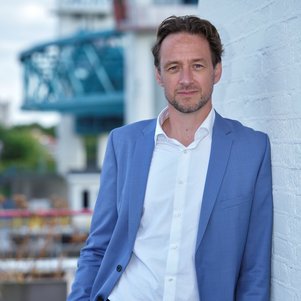NWO Perspectief grant for flood protection research
Large areas of the Netherlands are at risk of being flooded. It was only last year, 2021, that rivers in the province of Limburg overflowed. A rise in sea levels and weather extremes, caused by climate change, calls for new technical and nature-based solutions for flood risk management and climate adaptation. The Future Flood Risk Management Technologies (Future FRM Tech) programme, led by TU Delft's Bas Jonkman, will receive an NWO Perspectief grant to work on flood-resilient and climate-adaptive coasts and rivers.
In the coming years, the Future FRM Tech consortium will research and develop smart solutions to make coastal areas, rivers and estuaries safer - now and in the future. How do we strengthen dykes without sacrificing too much space? Can we build with nature to protect us from floods? The researchers also explicitly address legal, economic and governance aspects to enhance the practical use of solutions.
Knowledge from real-life cases
In the consortium, TU Delft collaborates with other universities, institutions and users of the solutions, such as design agencies, municipalities and water authorities. Due to this collaboration, the solutions will also be realised in a pilot during the project. The consortium focuses on real-life cases near the coastline of the province Zeeland and the rivers Lek and Geul. This allows outcomes to be implemented quickly and efficiently. "Solutions to make the water system safer will not only come from new technological developments, but also by building with nature," says Jonkman, professor of hydraulic engineering at TU Delft. In his Story of Science, Bas Jonkman talks about new solutions with nature as a guiding principle.
Innovative monitoring systems
To keep a close eye on existing dikes and identify weak spots, methods have been developed at TU Delft to monitor minimal movements of dykes with satellites. We previously published the Story of Science ‘The breathing of dykes’. Jonkman: "Future FRM Tech will further refine the dike monitoring system with local sensors inside the dikes and 3D subsurface data. This will allow us to calculate dike safety in real time and very accurately and allow water managers to have dikes reinforced efficiently and timely." In addition, the consortium will also work on a warning system that provides timely warnings if flood risks do occur.
Other countries are also struggling with flood risks, such as USA, Australia, South Africa and Germany. They have an urgent need for knowledge to better assess and prevent flood risks. International parties are therefore closely involved within the consortium.
About Perspectief
Perspectief is a programme of the Dutch Research Council (NWO), financed by the Ministry of Economic Affairs and Climate Policy (EZK). The Perspectief programme encourages researchers to form consortia with companies, government bodies and societal organisations. Together, they develop technological innovations that have a high impact on society and that help create economic opportunities for the Netherlands. The research programmes are aimed at addressing major societal challenges and the key enabling technologies, thereby contributing to the Mission-Driven Top Sectors and Innovation Policy of the Ministry of EZK.
Within the faculty CEG, Bart van Arem and Maaike Snelder's XCARCITY project was also awarded a Perspectief grant and we are collaborating on the WadSED project led by Maarten Kleinhans of Utrecht University.

